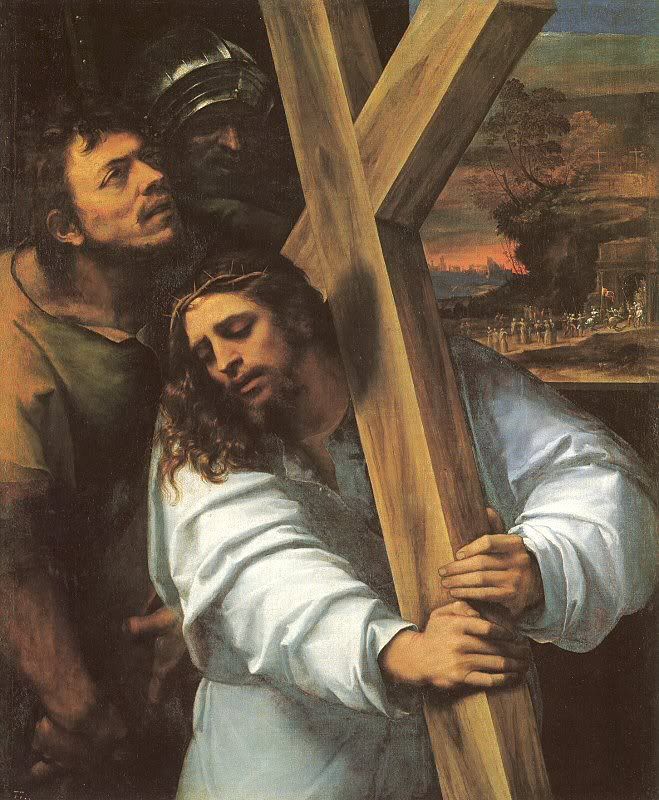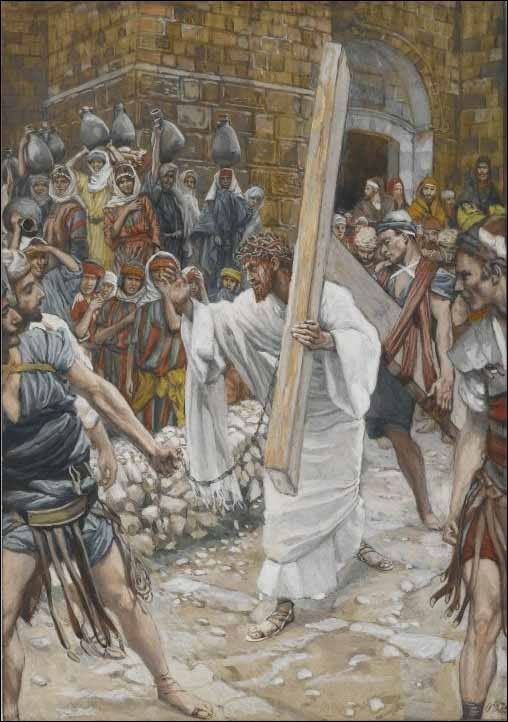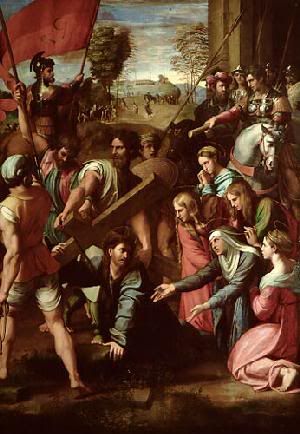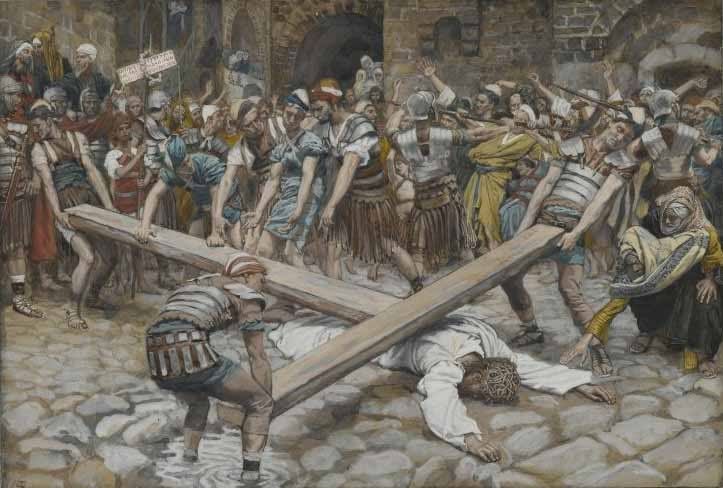Today, Good Friday, Jesus continues His steady march toward death, bringing us ever closer to forgiveness and new life. On the eve of His suffering, Holy Thursday, Jesus had celebrated the Passover with His disciples, and then taken Peter, James, and John with Him to the garden of Gethsemane. There, He prayed in agony until His arrest.
Jesus has been tried and condemned to death. He has been mocked and painfully scourged. He has endured the humiliation of a mock coronation, designed to make Him less than human, but only succeeding in elevating His divinity. And now, He must endure the Way of the Cross, the Fourth Sorrowful Mystery of the Holy Rosary.
16Finally Pilate handed him over to them to be crucified.
So the soldiers took charge of Jesus. 17Carrying his own cross, he went out to the place of the Skull (which in Aramaic is called Golgotha). (John 19: 16-17)
Saint Luke, in his Gospel, tells us a bit more about Jesus' journey along the Via Delarosa.
26As they led him away, they seized Simon from Cyrene, who was on his way in from the country, and put the cross on him and made him carry it behind Jesus. 27A large number of people followed him, including women who mourned and wailed for him. 28Jesus turned and said to them, "Daughters of Jerusalem, do not weep for me; weep for yourselves and for your children. 29For the time will come when you will say, 'Blessed are the barren women, the wombs that never bore and the breasts that never nursed!' 30Then " 'they will say to the mountains, "Fall on us!"
and to the hills, "Cover us!"’ 31For if men do these things when the tree is green, what will happen when it is dry?" (Luke 19: 26-31)
The Way of the Cross, The Way of Sadness, the Via Delarosa.
Jesus, taking upon Himself all the sins of the world, all the sadness and pain of those around Him, climbs to Golgotha. His burden is enormous—not the crossbar of the cross, which physically would have been too heavy for Him following the vicious scourging, but the spiritual and emotional burden he bore for us. Everything that Jesus carried up that hill, surrounded by the triumphant Romans, observed by the confused citizens, was marked by the stain of sin—rendered cumbersome, unwieldy, heavy. Too heavy for us. But not too heavy for He who loved us.
We can’t even begin to imagine the heaviness of His burden, or the heaviness of His steps. Each step brought Him closer to His final torment, His final torture, His human death. But each step also brought Him closer to the completion of His mission of love and forgiveness for us. This is clear, that even in the midst of the shadow of pain and sin that hung over Him on his long walk to the cross, He is thinking of us. Jesus stops to comfort the women of Jerusalem. “Weep not for me,” He says, “But for yourselves and your children.” He is predicting the final judgment. He is still, on His way to His death, calling those He is sacrificing for to repentance-- just as He continues to call us to repentance today.
Luke tells us in his Gospel that Jesus had some help. A man from the crowd, who theologians tell us becomes a respected elder in the earliest Christian church along with his sons following the crucifixion, is conscripted to assist Jesus. He lightens the load of Christ in a physical way, even if for just a moment. We are called to do the same for others, in our daily lives. And in doing for others, we are doing for Jesus.
The footsteps of Christ are heavy… And for us, we too dread the final steps of His journey to Golgotha. We walk with Him, on the streets of Jerusalem that are wet with His blood. We know what awaits Him. And we know what awaits us on Good Friday.
And then the hopelessness, desolation, and waiting of Holy Saturday.
But through our faith, through the love that the Lord has for us, we also know what awaits us on Easter morning. Even as we prepare for the horror of the crucifixion, we set our eyes firmly on the dawn of forgiveness, for that is the only thing that gives us the strength to continue on.
Why pray the Rosary every day for a year?
Each time the Blessed Virgin has appeared-- whether it be to Saint Bernadette Soubirous at Lourdes; to Lucia, Jacinta, and Francisco at Fatima; or to Mariette Beco at Banneux-- she has asserted the importance, saving grace, and power of praying the Holy Rosary on a daily basis. Based upon her words, the Rosary is penance and conversion for sinners, a pathway to peace, an end to war, and a powerful act of faith in Jesus Christ. Pope Paul VI presented the Rosary as a powerful means to reach Christ "not merely with Mary but indeed, insofar as this is possible to us, in the same way as Mary, who is certainly the one who thought about Him more than anyone else has ever done."
To show us how this is done, perhaps no one has been more eloquent than the great Cardinal Newman, who wrote: "The great power of the Rosary consists in the fact that it translates the Creed into Prayer. Of course, the Creed is already in a certain sense a prayer and a great act of homage towards God, but the Rosary brings us to meditate again on the great truth of His life and death, and brings this truth close to our hearts. Even Christians, although they know God, usually fear rather than love Him. The strength of the Rosary lies in the particular manner in which it considers these mysteries, since all our thinking about Christ is intertwined with the thought of His Mother, in the relations between Mother and Son; the Holy Family is presented to us, the home in which God lived His infinite love."
As Mary said at Fatima, "Jesus wants to use you to make Me known and loved. He wishes to establish the devotion to My Immaculate Heart throughout the world. I promise salvation to whoever embraces it; these souls will be dear to God, like flowers put by Me to adorn his throne."

Subscribe to:
Post Comments (Atom)












0 comments:
Post a Comment
Thanks for leaving a comment. If you wish to submit a prayer request, however, please do so above, using the "Contact" tab.